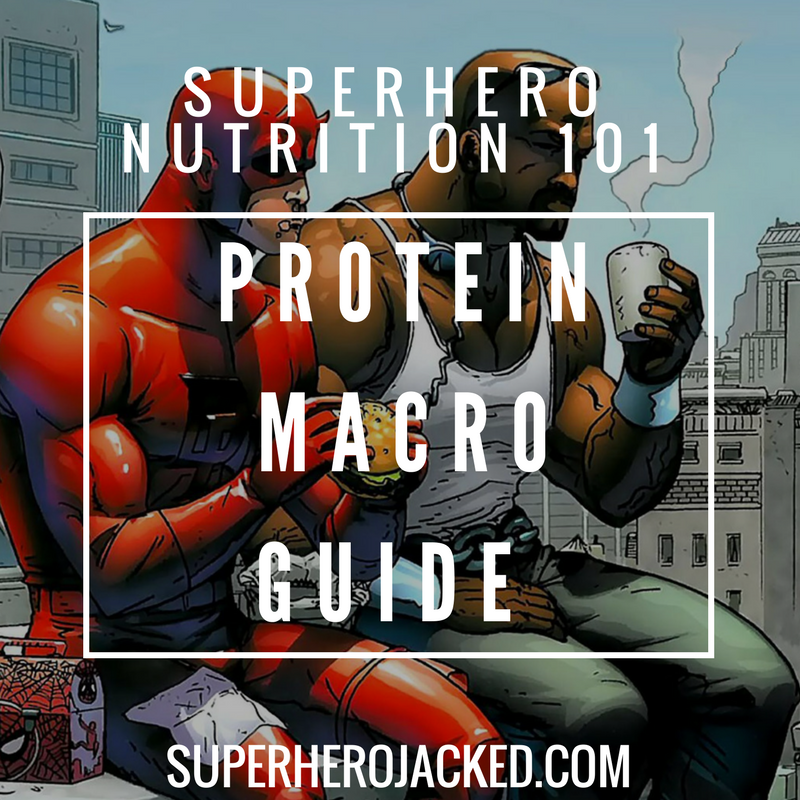Last updated on March 28th, 2020 at 11:08 am
 We’re taking things down to basics and covering what you need to know about macronutrients. Macronutrients, or macros for short, are nutrients that your body needs in large amounts. They also provide calories (energy) to help it run like a well-oiled machine on a day-to-day basis.
We’re taking things down to basics and covering what you need to know about macronutrients. Macronutrients, or macros for short, are nutrients that your body needs in large amounts. They also provide calories (energy) to help it run like a well-oiled machine on a day-to-day basis.
Beginners, this is especially for you, so take notes. Everyone else, feel free to enjoy this refresher as we cover what you need to know about proteins, carbs, and fats!
Protein
One of, if not the, most vital macronutrients all living beings need is protein.
The benefits and functions of protein include:
- Building, maintaining, and repairing bodily structures (i.e., muscles, tendons, ligaments, brain, organs, skin, hair, nails, circulatory system, immune system, cell membranes, and DNA)
- Energy (although it is not the body’s preferred source)
- Production of enzymes, hormones neurotransmitters, and antibodies,
- Transportation of various substances throughout the body
- Replaces old and worn out cells
- Supports healthy metabolism, lean body composition, immunity, and athletic performance
When broken down in the intestinal tract (in a process known as hydrolysis), proteins are separated into amino acids, the building blocks that make them up. There are approximately 20 different amino acids that perform various important functions for our body.
There are two types of amino acids:
- Non-Essential Amino Acids
These are made by the body, and don’t necessarily need to be obtained through food or supplementation.
11 Total: Arginine, Asparagine, Aspartic Acid, Cysteine, Glutamic Acid, Glutamine, Glycine, Proline, Serine, and Tyrosine
- Essential Amino Acids
These are not made the body, and therefore must be obtained outside via diet or supplementation.
9 Total: Histidine, Isoleucine, Leucine, Lysine, Methionine, Phenylalanine, Threonine, Tryptophan, and Valine
BONUS: Conditional Amino Acids
While these amino acids are usually non-essential, there are exceptions when the body does require greater amounts, which can be obtained either through food or supplements. Examples of such times would be illness, injury, or stress.
Includes: Arginine, Cysteine, Glutamine, Tyrosine, Ornithine, Proline, and Serine.
You may have heard about complete and incomplete proteins, especially in the context of vegan versus paleo diets. Let’s back track for a moment: complete proteins are foods (animal based, with exceptions) that contain all 9 of Essential Amino Acids, whereas incomplete proteins only contain some of them (plant based, with exceptions). Instead of telling you whether one of the former diets is best, think of striving to obtain a variety of protein rich foods throughout the day.
For example: Vegans no longer need to food combine different foods like rice and beans in one meal; having beans with lunch and rice with dinner will suffice. Those of you who choose to consume animal foods shouldn’t bother to combine steak with collagen peptides to get enough amino acids; have the peptides with breakfast (in a smoothie or Bulletproof Coffee), and the steak for dinner.
On that note, when it comes to calculating and tracking protein, you can opt for a saner approach by including it in every meal (and snack) you consume. The key here is to maintain balance. You don’t have to slave away by micromanaging every morsel that falls on your tongue. Just be mindful of what you’re consuming, and the amount of it, and you should be good to go!
The Top 5 Proteins You Should Consume
Add these to your list the next time you hit the grocery store!
In no particular order:
- Wild Caught Fish (i.e., salmon, sardines, mackerel, tuna)
- Eggs
- Poultry
- Grass-Fed Beef
- Organic Tempeh (a fermented patty made from soy and/or rice, high in plant-based protein, fiber, and probiotics for gut health; the fermentation process removes their phytic acid content, negating their anti-nutrient effects while making them easier to digest. If you are allergic to soy, following a low-carb diet, or are avoiding legumes, feel free to skip this.)
-Sam
AKA The Dragon
Sources:
http://www.bistromd.com/nutrition/know-your-macronutrients-protein
http://www.wikilectures.eu/w/Protein_in_Human_Nutrition
https://medlineplus.gov/ency/article/002222.htm
https://www.precisionnutrition.com/all-about-protein
Join The Superhero Academy and start unleashing your inner SuperHuman.

SUPERHUMAN SECRETS V.2
NOW UPDATED AND EXPANDED WITH A NEW SECTION & SEVEN BONUSES
USD$29 USD$14.95

